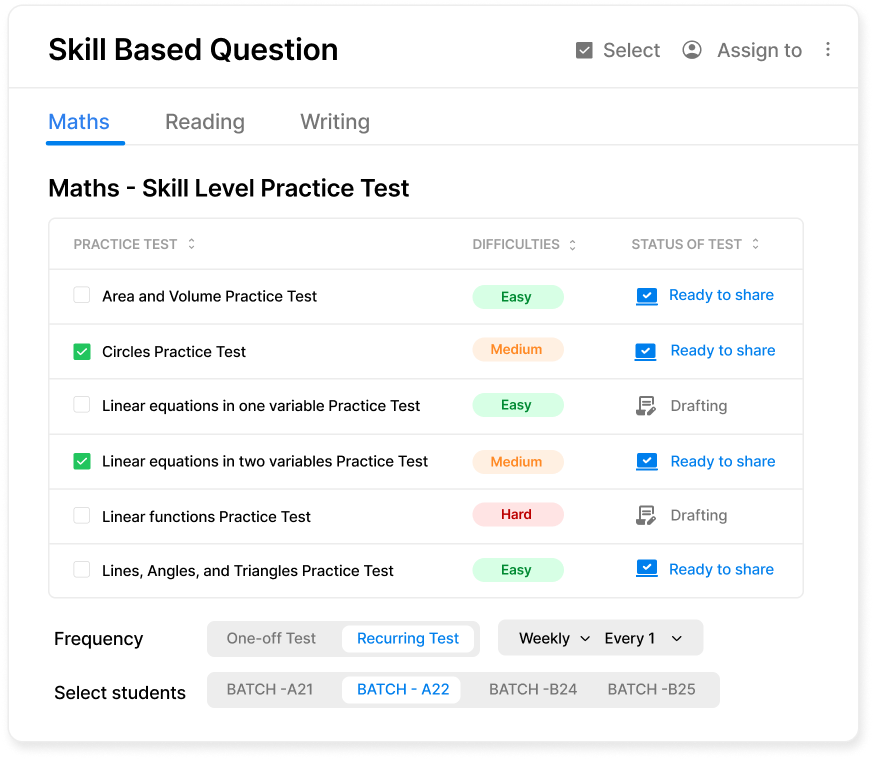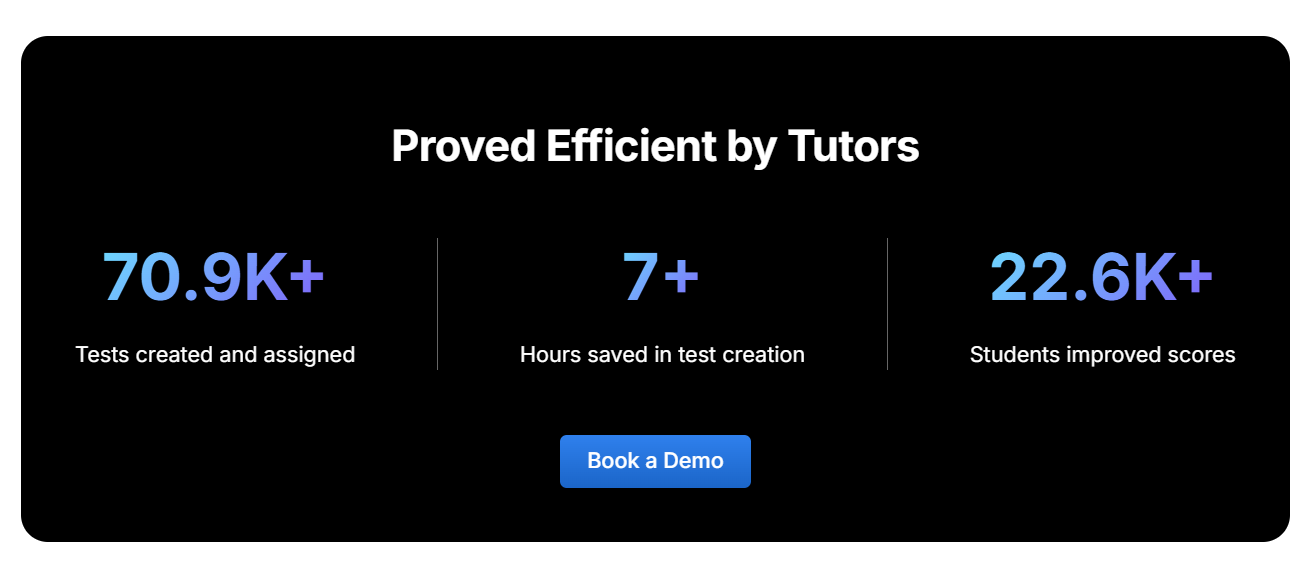




Key Takeaways
- Parents’ tough questions are chances to build trust and credibility.
- Clear, structured answers convert doubts into commitments.
- Data and progress reports turn promises into proof parents value.
Parents ask hard questions because they care—and because the stakes feel high. If you have been tutoring long enough, you have heard the same questions parents ask SAT tutors over and over again. These common SAT tutoring questions can feel repetitive, but they are also your best chance to build rapport. Your answers decide whether they trust you with their child, sign a package, or walk away. Thus, it becomes really important that you treat each question as a trust-building opportunity.
This guide will equip you with clear, practical responses to the most common parent concerns. You will get short scripts you can use in calls, ways to show real value, and how to use EdisonOS to prove progress and structure. Read this once and bookmark it—these lines will save you time and close more clients.
Common parent questions about SAT & ACT tutoring
Every parent has a set of go-to questions before they commit to tutoring. Some are about cost, others about results, and many are about trust—can you really help their child succeed? Below are the top parent questions you will hear, how to answer them, what evidence to show, and a short script you can use on the spot.
1. How much do you charge, and what is included?
Parents want clarity. Do not give an hourly number alone. Offer a package frame and explain what the package delivers: diagnostics, lesson plan, practice tests, progress reports, and revision homework. Break down the value so that the price appears as an investment, not a cost.
Show a sample roadmap and an example week of lessons. Use EdisonOS dashboards to display the exact report that parents receive after every session.

Sample answer: “My rate is $X per hour, but what I recommend is the 12-week program—diagnostic, weekly lessons, three full practice tests, and detailed progress reports. That package focuses on the areas that will raise the child’s score fastest and gives you clear milestones.”
2. How will you help my child improve their score?
Be specific. Explain your method: diagnose, prioritize, teach strategies, timed practice, and review. Parents want to know you are not just practising questions, but are also fixing the gap behind the mistakes.
When thinking about how to answer parents about SAT tutoring, the key is to focus less on promises and more on process, structure, and results.
Share examples: show a student who moved from 1150 to 1300 and highlight which skills changed. Use EdisonOS analytics to show skill-level breakdowns and time-on-task improvements.

Sample answer: “We start with a diagnostic to find exactly where points are lost. Then we build a custom plan—targeted lessons, strategy work, and timed practice. I will show you weekly reports so you can see where we are gaining points.”
3. How many hours of tutoring will my child need?
Avoid promises. Give ranges tied to goals. For example, small improvements (30–60 points) often take 8–12 hours to target. Bigger jumps (150+ points) need 60+ hours, consistent practice, and timed testing. Make it concrete and tied to the student’s starting score and timeline.
Offer a phased plan: diagnostic + focused block + test simulations + final polish. Track progress with EdisonOS so you can adjust hours if needed.
Sample answer: “Most students need 8–12 focused hours to fix small weaknesses. If your goal is a 150-point gain, plan for a 3–4 month program with regular practice tests. We will re-evaluate every month based on progress.”
4. What makes you different from other tutors or test prep programs?
Answer with proof, not rhetoric. Mention your methods, success stories, and the structure you provide. Explain how your approach saves time—fewer hours for better gains—because you target weak spots rather than slog through every topic.
Show EdisonOS artefacts: custom tests you build, adaptive drills, and progress graphs parents will see. A side-by-side comparison of “group class vs. personalized plan” can be persuasive.
Sample answer: “Unlike one-size-fits-all programs, I build a curriculum just for your child, using diagnostics and adaptive practice. You will get weekly reports and a simulated digital test experience so we know we are improving the right skills.”
5. Can you guarantee a score improvement?
Be honest and firm. Never guarantee an exact point increase. Instead, promise a structured process, accountability, and measurable short-term milestones. Explain the factors beyond your control: test day conditions, student effort, and time available.
Offer conditional language: if the student follows the plan and completes practice, you will expect measurable gains, then show past averages.
Sample answer: “I can’t ethically guarantee a specific score. What I guarantee is a structured, data-driven process and weekly evidence of progress. Historically, students who follow the plan see an average improvement of X points in Y weeks.”
6. How do you keep my child motivated and accountable?
Parents worry about homework and follow-through. Explain your system: short daily practice, weekly goals, mistake logs, and consequences that are positive and practical (mini rewards, progress check-ins).
Use EdisonOS to automate accountability: assignments, completion tracking, and reminders. Show parents the dashboard that flags late work automatically.

Sample answer: “We set weekly micro-goals and I assign short daily sets so progress is visible. EdisonOS tracks completion and shows me exactly when a student is falling behind, so I intervene quickly.”
7. How flexible is your scheduling?
Make flexibility a selling point, but set boundaries. Explain your cancellation policy, typical session windows, and how you handle rescheduling. Offer a few options: fixed weekly slot, rolling schedule, or concentrated bootcamp. If you offer makeups, be clear about limits.
Sample answer: “I keep two consistent weekly slots for each student, and we offer up to two makeups per month with 24-hour notice. For busier families, I run condensed weekend blocks that the student can choose.”
8. What if my child does not improve?
This is a fear-based question. Answer with process, not panic. Explain early warning signs you monitor and the interventions you deploy, like changing strategy, adding practice tests, adjusting pacing, or including a subject specialist.
Offer a remediation plan and a money-back or partial credit policy only if you want to stand out—but be realistic and protect your time.
Sample answer: “If progress stalls, we will run a targeted diagnostic, change tactics, and increase test simulations. If we follow those steps and results still do not improve, we will discuss a tailored refund or extra sessions at no additional cost—depending on the case.”
Quick scripts to handle common pushback
When parents hesitate on price, guarantees, or timing, having ready-made responses can make the difference between losing a client and building trust—these quick scripts will help you handle pushback with confidence and empathy.
“We will try free resources first.”
“Free resources are great for exposure, but they do not diagnose or prioritize. I will run a short diagnostic and show you exactly where practice will translate into real score gains.”
“This seems expensive.”
“I understand. You may compare the cost to a group class or aimless study. My plan focuses only on the skills that raise scores—so you invest less time and see more improvement.”
“Do you guarantee results?”
“I cannot promise a number, but I promise a structured plan, weekly evidence, and data-backed adjustments until we see progress.”
How to use EdisonOS to answer parent questions with confidence
Parents want evidence, not reassurance. EdisonOS gives you the data and structure to turn promises into proof. Instead of saying “your child is improving,” show them ‘how’. By grounding every answer in real numbers and clear reports, you shift the conversation from opinion to credibility, making parents far more likely to trust your approach. These four actions will convert your words into proof.
1. Run diagnostics on both SAT and ACT
Start with side-by-side baseline assessments so parents see exactly where their child stands. Present raw score data along with a prioritized skills list—grammar rules, algebra concepts, pacing issues—so it is clear you are not guessing about strengths and weaknesses.
2. Use concordance-linked score reports and trend lines.
Show parents how a 1250 SAT translates into a 26 ACT, and track how that changes with prep. Trend lines across tests give families projected outcomes, helping them see not just where the student is now, but where they are headed if they stay consistent.
3. Build custom study paths and BYOT practice tests.
With Build Your Own Test (BYOT), you can design full digital-style practice exams in under an hour. Each test is tailored to the student’s skill gaps, mirroring the official SAT/ACT interface so practice feels like the real thing. Parents trust a structured plan more than random worksheets.
4. Share visual dashboards with parents.
Instead of vague updates, give parents hard data: score breakdowns by section, accuracy heat maps, and time-on-task analytics. When they can literally see progress on screen, you eliminate doubts and turn conversations about value into conversations about results.
When a parent asks for evidence, pull up a dashboard in the meeting and walk them through the metrics. That moment changes the conversation from “Why so expensive?” to “How soon can we start?”

The bottom line
Confident SAT ACT tutor communication is not just about answering questions, but also about showing parents you have a proven system for results.
See parents’ questions as opportunities to show your professionalism. Prepare answers, show evidence, and use platforms like EdisonOS to make your results visible and credible.
When you respond confidently—backed by data, timelines, and clear next steps—you build trust fast. Parents sign when they feel you can make progress measurable and predictable.
Book a demo with EdisonOs today.
Frequently asked questions
Tutors Edge by EdisonOS
in our newsletter, curated to help tutors stay ahead!
Tutors Edge by EdisonOS
Get Exclusive test insights and updates in our newsletter, curated to help tutors stay ahead!











.png)
.webp)
